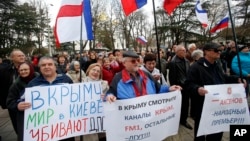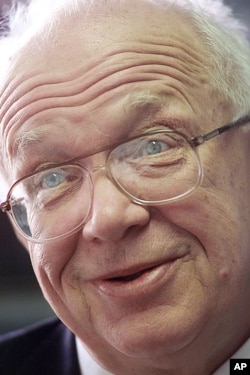WASHINGTON —
Crimea is a Ukrainian peninsula, home of Russia’s Black Sea fleet which allows Moscow to extend its military presence throughout the Mediterranean.
The majority of its population is ethnic Russian, a quarter is ethnic Ukrainian and about 12 percent are Crimean Tatars.
For centuries, Crimea was part of Russia, until 1954 when Soviet leader Nikita Khrushchev gave the peninsula to Ukraine - at that time a Soviet republic.
Nikita Khrushchev gives Crimea to Ukraine
Khrushchev’s son Sergei said the decision to give Crimea to Ukraine had to do with economics and agriculture - the building of a hydro-electric dam on the Dnieper River which would irrigate Ukraine’s southern regions, including Crimea.
“As the Dnieper and the hydro-electric dam [is] on Ukrainian territory, let’s transfer the rest of the territory of Crimea under the Ukrainian supervision so they will be responsible for everything," Sergei Khrushchev said. "And they did it. It was not a political move, it was not an ideological move - it was just business.”
Khrushchev said it made sense to have one entity responsible for the building of such a large project.
“And now we have this speculation that my father wanted to satisfy Ukrainian democracy, that he even made a gift to his wife, my mother, because she was Ukrainian - all this have nothing with reality. It was just an economical issue, and not political,” said Khrushchev.
Crimea Now under Russian Control
Crimea is now under complete control of Russian armed forces. Russian officials say the move was to protect ethnic Russians living on the peninsula. But western officials say there is no evidence that Russians need protection. U.S. Secretary of State John Kerry described the takeover as “an incredible act of aggression.”
Tensions rose between Moscow and Kyiv last month after Ukraine’s pro-Russian president Viktor Yanukovich was overthrown by a protest movement wanting closer ties with the European Union. More than 80 demonstrators were killed and Mr. Yanukovich fled to Russia.
Khrushchev said there are no parallels between what is happening in Crimea and the 2008 war between Russia and Georgia over its two breakaway regions of South Ossetia and Abkhazia.
“In the 2008 war there, the president [Mikhail] Saakashvili tried to restore control over these two rebel regions using force - and they attacked them and Russia fought back. It was war.”
Referendum on Crimea’s Future March 16
Right now, said Khrushchev, no shots have been fired in Crimea.
“And I hope there will be no shooting, because nobody is interested there in fighting. And the Ukrainian military who are serving in Crimea, they are Crimeans and they don’t want to start fighting," said Khrushchev, “that will be against the interest of their own people and their own country. And I think the Russians also don’t want to fight. Why do they have to fight?”
Looking ahead, Khrushchev said giving Crimea back to Russia is not an option - “and I hope it’s not going to happen. And I never heard from Putin that he wanted to do it.”
However, lawmakers in Crimea have scheduled a referendum on joining Russia for March 16 - a move that will escalate tensions even more.
The majority of its population is ethnic Russian, a quarter is ethnic Ukrainian and about 12 percent are Crimean Tatars.
For centuries, Crimea was part of Russia, until 1954 when Soviet leader Nikita Khrushchev gave the peninsula to Ukraine - at that time a Soviet republic.
Nikita Khrushchev gives Crimea to Ukraine
Khrushchev’s son Sergei said the decision to give Crimea to Ukraine had to do with economics and agriculture - the building of a hydro-electric dam on the Dnieper River which would irrigate Ukraine’s southern regions, including Crimea.
“As the Dnieper and the hydro-electric dam [is] on Ukrainian territory, let’s transfer the rest of the territory of Crimea under the Ukrainian supervision so they will be responsible for everything," Sergei Khrushchev said. "And they did it. It was not a political move, it was not an ideological move - it was just business.”
Khrushchev said it made sense to have one entity responsible for the building of such a large project.
“And now we have this speculation that my father wanted to satisfy Ukrainian democracy, that he even made a gift to his wife, my mother, because she was Ukrainian - all this have nothing with reality. It was just an economical issue, and not political,” said Khrushchev.
Crimea Now under Russian Control
Crimea is now under complete control of Russian armed forces. Russian officials say the move was to protect ethnic Russians living on the peninsula. But western officials say there is no evidence that Russians need protection. U.S. Secretary of State John Kerry described the takeover as “an incredible act of aggression.”
Tensions rose between Moscow and Kyiv last month after Ukraine’s pro-Russian president Viktor Yanukovich was overthrown by a protest movement wanting closer ties with the European Union. More than 80 demonstrators were killed and Mr. Yanukovich fled to Russia.
Khrushchev said there are no parallels between what is happening in Crimea and the 2008 war between Russia and Georgia over its two breakaway regions of South Ossetia and Abkhazia.
“In the 2008 war there, the president [Mikhail] Saakashvili tried to restore control over these two rebel regions using force - and they attacked them and Russia fought back. It was war.”
Referendum on Crimea’s Future March 16
Right now, said Khrushchev, no shots have been fired in Crimea.
“And I hope there will be no shooting, because nobody is interested there in fighting. And the Ukrainian military who are serving in Crimea, they are Crimeans and they don’t want to start fighting," said Khrushchev, “that will be against the interest of their own people and their own country. And I think the Russians also don’t want to fight. Why do they have to fight?”
Looking ahead, Khrushchev said giving Crimea back to Russia is not an option - “and I hope it’s not going to happen. And I never heard from Putin that he wanted to do it.”
However, lawmakers in Crimea have scheduled a referendum on joining Russia for March 16 - a move that will escalate tensions even more.






